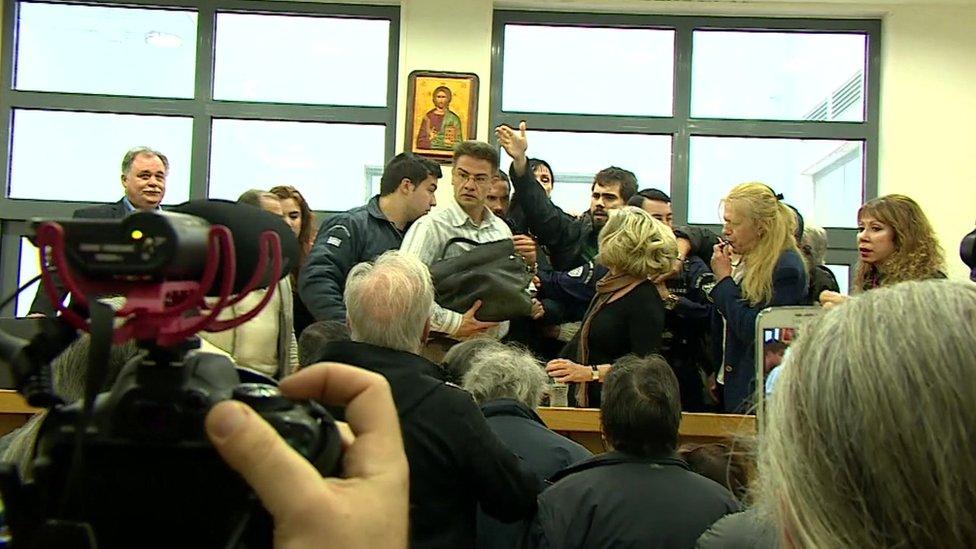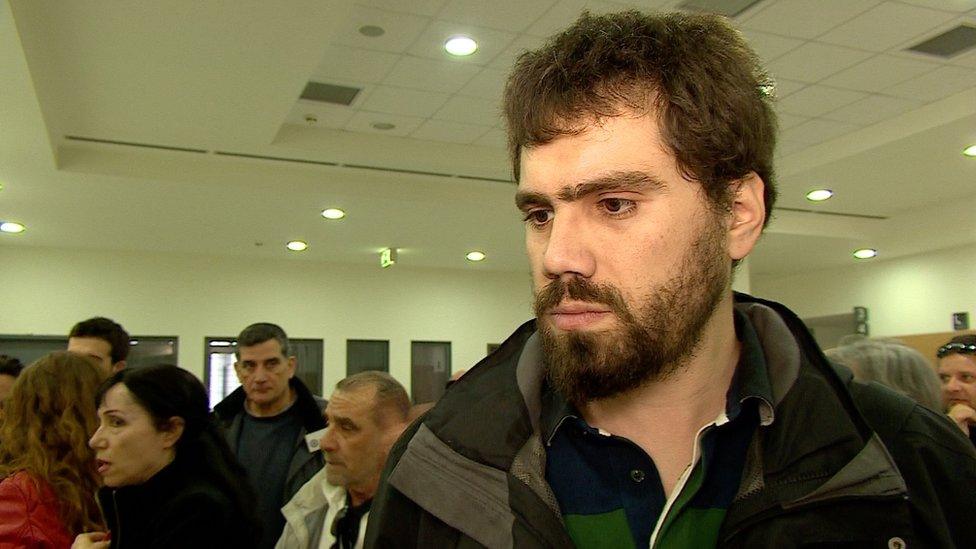Greeks bridle against 'never-ending' austerity
- Published
Greek activists storm court hearings to save homes
In normal times, in a normal country, court proceedings over mortgage arrears would not be the stuff of headline news.
But these are not normal times in Greece and such cases have been making national television bulletins.
In a soulless white concrete court building, leaders of the I Won't Pay movement have been turning routine eviction proceedings into the frontline in a popular fight-back against austerity.
The protesters - noisy and feisty but non-violent when we saw them - turn out in force to block the progress of cases where banks seek to repossess houses where loans have fallen into arrears.
It can be a short, dramatic and effective piece of direct action.
People vs 'machine'
On the afternoon we went to court, the demonstrators, chanting and cheering, crowded onto the judicial benches and spilled over into the witness box.
A lawyer representing one bank found himself hemmed in and surrounded, unable to make his case because he was unable to make himself heard.
The case was adjourned and the housing activists cheered and whistled what they saw as a rare victory for ordinary Greek people over a kind of international machinery of austerity.

Austerity-weary protesters are taking matters into their own hands - here preventing a lawyer presenting a case for a repossession

Ordinary people have to become activists to try to defend themselves from more hardship, says I Won't Pay's Ilias Papadopoulous
One of the leaders, Ilias Papadopoulous, said: "More than half of the Greek people live in poverty below the level where they have any dignity. The government won't protect them so we are here to protect them."
The victory, of course, isn't final - it's hard to believe that the bank will give up on its money and its reasonable to assume that its lawyer will be back in court one day soon.
But the case provided an insight into the popular mood in a country worn down by years of austerity.
Even the European Commissioner for Finance Pierre Moscovici has spoken of the need to provide the Greek people with some kind of light at the end of the austerity tunnel. He's even pronounced himself "hopeful" on the issue.
But it is hard to find many Greek people who share in his share of optimism.
In a week in Athens I met a couple planning to emigrate in search of work immediately after their wedding next month, the manager of a TV station whose staff have not been paid for months and a young man with an MBA working as a taxi-driver, who told us he saw "absolutely no hope" for the future.
So the mood could hardly be bleaker as the Greek government prepares for another round in its apparently never-ending dance with its main international creditors - the eurozone and the IMF.
Greece is hoping that the previous formula whereby it signed up to painful economic reforms in return for phased bailouts might now be relaxed.
Why is Greece back in the headlines?
Greece: EU and IMF in 'common position'
In big picture terms, the Greek position remains dauntingly bad.
Its ratio of debt to GDP - how much it owes compares to how much it earns - stands at an eye-watering 180% and its long term hope has to be that at some point at least some of that debt will be written off.
In the short term though that's highly unlikely. The leaders of the eurozone face elections this year in the Netherlands, France and Germany - not a good moment to tell their taxpayers that they will not be getting their money back from Greece.
And the IMF, which is sympathetic to a write-off, would only want to see it happen in the context of further structural reforms which would try the patience of the Greek voters to breaking point.
"The idea of reform has become toxic in Greece," says Nick Malkoutzis, editor of the influential economic intelligence website MacroPolis, "because when the other side says, 'This is what you need to do in order to put your economy on a better footing', what the average Greek hears is that 'I'm going to take another hit in my pocket'".
Elite caution?
The Greek government, though, senses a moment of opportunity in a world where its debt crisis has been overshadowed at least for now by the dramas of Brexit and the election of US President Donald Trump.
They intend to push for a different framework for negotiations with their creditors where in future on direct concessions on pension reform would be balanced out by, for example, a possible tax cut.
Greek Deputy Foreign Minister Georgios Katrougalos calculates that what he calls a global elite which has already suffered a series of shocks in recent months won't want to resist provoking the anger of the Greek people.
"There is a general disenchantment in Europe," he told me, "especially in Greece because we have been hit harder by austerity.
"So the real question now is how to reverse austerity and I think there is hope in that because I think that the elite know they can't govern as they did before - the election of Trump shows that and shows the people won't consent to be governed as they were before."
We will not know if the minister's calculation is correct until Greece begins formal negotiations with its creditors again.
If he's right then perhaps the pervasive mood of gloom in Greece might begin to lift - but for now when Greeks hear talk about "light at the end of the tunnel" they feel the tunnel remains dauntingly long and the light remains frustratingly dim.